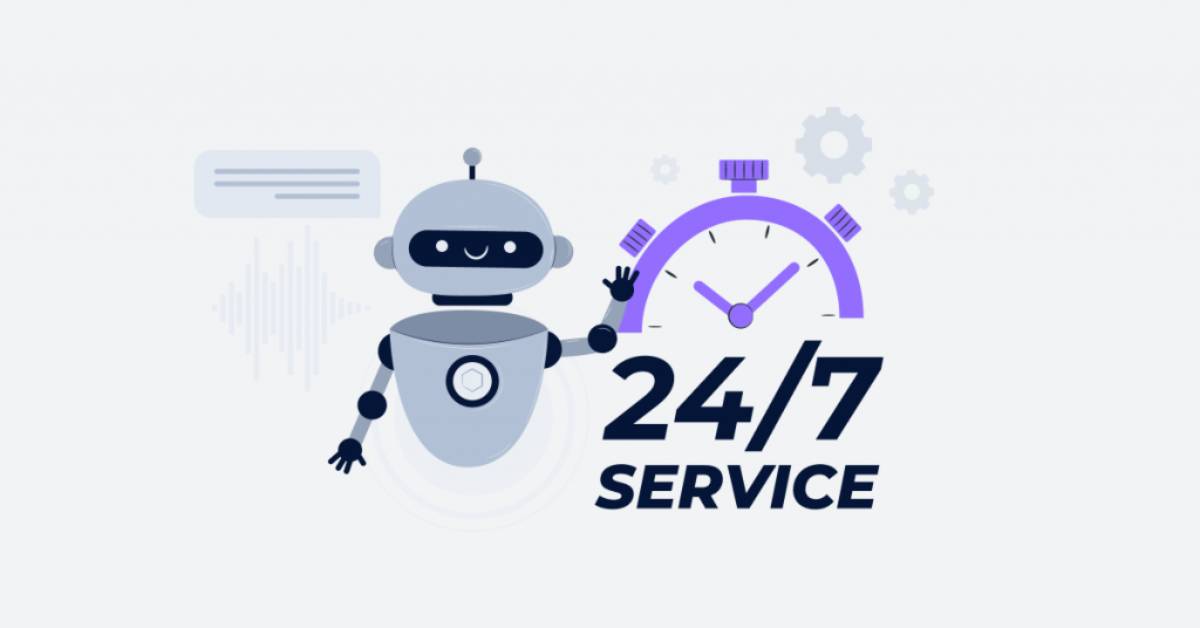
Implementing AI for 24/7 Customer Engagement
Today, businesses use artificial intelligence (AI) to boost customer service. Using AI for 24/7 customer engagement isn’t just a trend; it’s a must for companies. This helps increase customer satisfaction and improve operations. AI systems are changing how companies connect with customers. They offer a quicker, more efficient, and customised service for each person. This blog explores the importance of AI in customer engagement. It examines its benefits, common mistakes, and key insights for successful use.
Key Benefits of AI in Customer Engagement
AI customer engagement is revolutionising how businesses interact with their clients. One of the most compelling advantages is the ability to provide continuous support. AI-powered systems work 24/7, which means customers get help anytime they need it, unlike traditional methods. Being available 24/7 greatly improves customer satisfaction and loyalty, which are key to staying competitive in today’s fast-paced business world.
Continuous Support: Around-the-Clock Assistance

AI customer engagement tools, like chatbots and virtual assistants, are helpful. They’re available all day, every day. 24/7 support is especially important for businesses with global customers. It allows people in different time zones to get help whenever needed. AI tools are always available. Unlike human agents, they don’t need to rest. They can handle inquiries and solve problems even outside regular business hours. Accessibility is key for e-commerce, travel, and tech support. Customers in these fields want quick responses.
A 24/7 support system helps customers who can’t reach us during regular hours. AI systems ensure that every inquiry gets answered, building reliability and trust and enhancing the overall customer experience. The system can also send complex questions to human agents when needed, so customers won’t feel abandoned.
Speed and Efficiency: Handling High Volumes with Ease
AI communication tools manage many inquiries at once, cutting wait times and boosting the efficiency of customer interactions. Unlike human agents, AI systems can juggle multiple conversations simultaneously, offering instantaneous responses. Automated support systems like chatbots can manage many routine questions, letting human agents focus on more complex issues.
This change cuts wait times and speeds up service delivery. During busy times or peak seasons, AI tools quickly help customers. Businesses can handle many queries at once, allowing them serve more customers without hiring extra staff. As a result, they can use resources better and save money.
Data-Driven Insights: Improving Service with Analytics
One main advantage of AI in customer engagement is how it collects and analyses vast data from customer interactions. These insights reveal key details about what customers want, how they act, and the problems they face. By utilising AI-powered analytics, businesses can uncover trends and optimise their services accordingly.
AI tools can monitor how customers use support channels and identify the most common questions asked. With this data, companies can customize their knowledge bases, update FAQs, and automate replies to common issues. This data helps improve the customer experience over time and ensures businesses stay ahead of new trends and challenges.
According to Business Insider, companies that use AI communication tools experienced a 25% rise in customer satisfaction. Businesses report a 30% drop in operational costs due to automated support systems. AI customer engagement offers real benefits. Companies can boost profits and enhance customer loyalty by using AI.
Additional Expert Tips & Common Mistakes to Avoid
The benefits of AI in customer service are clear. However, to succeed, careful planning and execution are needed. Businesses should steer clear of typical errors. These mistakes can reduce the benefits of AI tools and lead to bad customer experiences.
Mistake #1: Underestimating the Importance of Personalisation

A common mistake businesses make with AI is underestimating personalisation. AI tools, such as chatbots, are often seen as generic, one-size-fits-all solutions. To improve the customer experience, AI systems should match the brand’s voice. They also need to address the specific needs of the target audience.
AI tools should efficiently answer questions. They must also engage customers in a personalised, human way. You can achieve this by using custom scripts and tailored responses. Also, use customer data to make better recommendations. Personalisation boosts customer satisfaction and loyalty. When a company knows what customers want, they often come back.
Mistake #2: Neglecting the Human Element
While AI can handle many tasks, situations will always require human intervention. AI systems are great at automating routine questions. However, they struggle with complex, emotional, or context-heavy issues. A chatbot can help book a flight. However, it may not resolve billing issues or customer frustration with a faulty product.
Businesses should ensure a seamless transition between AI and human agents. When an AI system finds an issue it can’t handle, it should quickly pass the case to a human representative. This person can give more personalised help. This hybrid approach makes sure customers get great service at every step.
Mistake #3: Failing to Continuously Improve AI Systems
AI systems are not set-it-and-forget-it solutions. They require regular updates and maintenance to ensure they remain practical and relevant. Not updating AI tools can cause outdated information and errors and lower customer satisfaction. AI systems need regular training, fine-tuning, and monitoring to perform their best.
Businesses need to regularly check how well AI tools meet customer needs. This includes collecting feedback from customers and agents. Then, analyze performance metrics and find areas to improve.
Advanced Insights and Expert Recommendations
Businesses can improve customer engagement by using AI for better insights. Here are expert tips to help AI systems meet and exceed expectations.
Leverage AI Analytics for Deeper Insights
AI tools offer more than automated responses. They also create useful data-driven insights. Businesses can examine customer interactions. This helps them find problems, spot trends, and predict future needs. AI analytics can show where customers face challenges. It also reveals how to enhance service delivery.
If customers often ask about a specific product feature, businesses can use this information. They can update FAQs or create tutorials to address these questions ahead of time. AI analytics helps companies find peak service times. This lets them allocate resources better during busy periods.
Integration with Other Customer Service Platforms
AI performs best when combined with other customer service tools, including customer relationship management (CRM) systems and help desk software. A unified system helps businesses share information smoothly across all service channels. When a chatbot gathers information from a customer, human agents should access that data, too. This helps them follow up or offer more assistance if needed.
This integration improves the customer experience. It gives agents a full view of the customer’s journey, enabling them to offer better and more personalized support.
Predictive Analytics: Anticipating Customer Needs
AI-powered predictive analytics can enhance customer engagement by predicting customer needs and behaviors. Predictive tools look at past data and help us guess what customers need before they ask. AI can alert customers to a possible problem with their order before they see it. It can also suggest a service upgrade based on how they use it.
Addressing customer needs proactively improves satisfaction and fosters long-term loyalty. Customers are more likely to return if a business meets their needs and provides timely solutions.
Conclusion: Implementing AI for 24/7 Customer Engagement
Using AI for round-the-clock customer engagement is a smart move for businesses. It helps improve their customer service. Embracing AI for customer engagement helps companies offer 24/7 support. It also boosts efficiency and provides insights into customer behaviour.
A thoughtful strategy is essential for success. Businesses must dodge pitfalls that many stumble over. They often ignore personalisation, avoid the human touch, and fall behind in updating AI systems.
Companies can boost AI communication tools by focusing on three main areas:
- Personalised experiences
- Easy integration
- Ongoing training
As we move further into the digital age, the importance of AI in customer service will only continue to grow. Companies that use this technology and adapt to its details will do well in a challenging market.
Are you ready to transform your customer service operations with AI? Think about these insights and start changing your customer engagement strategy today.